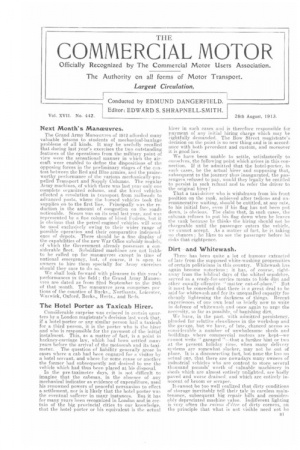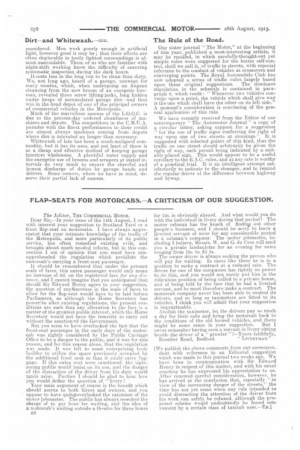Next Month's Manceuvres.
Page 1

Page 2

If you've noticed an error in this article please click here to report it so we can fix it.
The Grand Army Ma.meuvres of l912 afforded many valuable lessons to students of mechanical-haulage problems of all kinds. It may be usefully recalled that during last year's exercises the two outstanding features of the operations from the military point of view were the sensational manner in which the aircraft were enabled to define the dispositions of the opposing forces in the preliminary stages of the cumtest between the Red and Blue armies, and the praiseworthy performance of the various mechanically-propelled Transport and Supply Columns. The regular Army machines, of which there was last year only one complete organized column, and the hired vehicles effected a revolution in transport from railheads to advanced posts, where the horsed vehicles took the supplies on to the first line. Principally was the reductmn in the amount of congestion on the roads noticeable. Steam was on its trial last year, and was represented by a fine column of hired Fodens, but it is obvious that the petrolengined vehicles will seem be used exclusively owing to their wider range of possible operation and their comparative independence of depots. There should be a fine display of the capabilities of the new War Office subsidy models, of which the Government already possesses a considerable fleet. Subsidized machines are not liable to be called up for manceuvres exe.ept in time of national emergency, butt, of course, it is open to owners to hire them specially for Army exercises should they cave to do so.
We shall look forward with pleasure to this year's performances in the field ; the Grand Army Manceuyres are dated as from 22nd September to the 28th of that month. The manceuvre area comprises par tions of the counties of Bucks., Northants, Leicester, Warwick, Oxford, Berks., 'Herts., and Beds,
The Hotel Porter as Taxicab Hirer.
Considerable surprise was evinced in certain quarters by.a. London magistrate's decision last week that, if a hotel-Porter or any similar person hail a taxicab for a third person, iL is the porter who is the hirer and who is responsible for the payment of the initial instalment. This, as a matter of fact, is a. point in hackney-carriage law, which had been settled many years before the arrival of the motorcab and its taxi meter. The question of liability generally arose in cases where a cab had been engaged for a visitor by ahotel servant, and where for some cause or another the former had subsequently not desired to use the vehicle which had thus been placed at his disposal. In the pre-taximeter days, it is not difficult to imagine that the cabman, in the absence of any mechanical indicator as evidence of expenditure, used his renowned powers of peaceful persuasion to effect a. settlement, nor is it likely that the hotel porter was the eventual sufferer in many instances. But it has for many years been recognized in London and in certain of the big provincial cities to our knowledge, that the hotel porter or his equivalent is the actual hirer in such eases and is therefore responsible for payment of any initial hiring charge which may be rightfully demanded. The Bow Street magistrate's decision on the point is no new thing .and is in accordance with both precedent and custom, and moreover it is good law.
We have been unable to settle, satisfactorily to ourselves, the following point which arises in this connection. flit be admitted that the hotel-porter, in such cases, be the actual hirer and supposing that, subsequent to the journey thus. inaugurated, the passengers refused to pay, would they legally be entitled to persist in such refusal and to refer the driver to the original hirer
That a taxi-driver who is withdrawn from his front position on the rank, achieved after tedious and tinremunerative waiting, should be entitled, at any rate, to his initial fare, even if his flag has not been put down, is obvious. The claim that, in such cases, the cabman refuses to put his flag down when he leaves the rank because he thinks the hiring should not. be chargeable until the passenger enters the vehicle, we cannot accept. As a matter of fact, he is taking no chances : he likes to see the passenger before he risks that eightpence.
Dirt-and Whitewash.
There has been quite a lot of humour extracted cf late from the supposed white-washing propensities of certain politicians in this country. Whitewash has again become notorious ; it has, of course, rightaway from the biblical days of the whited sepulchre, served as a ready-for-service means to hide dirt. and other equally-offensive " miter out-of-place." But it must be conceded that there is a great deal to be said for whiteR ash and for its unequalled capacity for cheaply lightening the darkness of things. Recent experiences of our own lead us briefly now to write in defence of whitewash and once again to urge the necessity, so far as possible, of banishing dirt.
We have, in the past, with admitted persistency, pleaded for relative cleanliness in the workshop and the garage, but we have, of late, chanced across so censiderable a number of unwholesome sheds and buildings where commercial motors are kept—we cannot write " garaged "—that a further hint or two at the present holiday time, when many delivery systems are somewhat slacker, may not he out of place. It is a disconcerting fact, but none the less an actual one, that there are nowadays many owners of industrial vehicles who are content to store several thousand pounds' worth of valuable machinery in sheds which are almost entirely unlighted. are badly paved and worse drained. and which are entirely innocent of broom or scraper.
It cannot be too well realized that dirty conditions of storage inevitably tell their tale in careless maintenance, subsequent big repair bills and considerably depreciated machine value. Indifferent lighting is very often the raiRon (1' 17t re of dirty corners, on the principle that what is not visible need not he
considered. Men work poorly enough in artificial light., however good it may be ; that their efforts are often deplorable in badly lighted surroundings is almost unavoidable. Those of us who are familiar with night-shift working know the difficulty of ensuring systematic inspection during the dark hours. It costs less in the long run to be clean than dirty. We, not long ago, heard of a garage, unswept for many months, which, when undergoing an Augean cleansing from the new broom of an energetic foreman, revealed three screw lifting-jacks, long hidden under heaps of accumulated garage dirt—and that was in the head depot of one of the principal owners of commercial vehicles in the Metropolis. Much of the marvellous success of the L.G.O.C. is due to the present-day ordered cleanliness of machines and depots. The competitors in the C.M.U.A. parades with the finest performances to their credit are almost always machines coming from depots where dirt is tolerated no longer than necessary. Whitewash of late has been a much-maligned commodity, but it has its uses, and not least of those is as a cheap and effective method of keeping garage interiors wholesome. A plentiful water supply and the energetic use of brooms and scrapers at stated intervals do very much to ensure the cheerful and honest discharge of duties by garage hands and drivers. Some owners, whom we have in mind, deserve their partial lack of success.
The Rule of the Road.
Our sister journal " The Motor," at the beginning of this year, published a most-interesting article, it may be recalled, in which carefully-thought-out yet simple rules were suggested for the better self-control, shall we call it, of traffic in streets, with especial reference to the conduct of vehicles at crossovers and converging points. The Royal Automobile Club has now adopted a. series of traffic rules largely based
upon these original suggestions. The dominant stipulation in the schedule is contained in paragraph 8, which reads : "Whenever two vehicles converge upon a point, the vehicle which shall give way is the one which shall have the other on its left side." A moment's consideration is convincing of the general application of this rule.
We have recently received from the Editor of our contemporary The Automotor Journal " a copy of a circular letter, asking support for a suggestion " for the use of traffic signs conferring the right of way upon one of two streets at crossings." It is suggested with selected points of this kind, that the traffic on one street should arbitrarily be given the right of way, such permit being indicated by a suitably-placed sign. This would appear to be a useful corollary to the R.A.C. rules, and at, any rate is worthy of a practical trial. It is an intelligent attempt satisfactorily to indicate to the stranger, and to remind the regular driver of the difference between highway and byway.
























